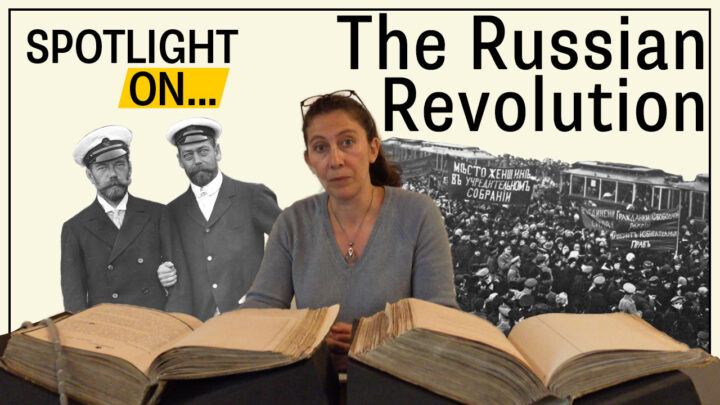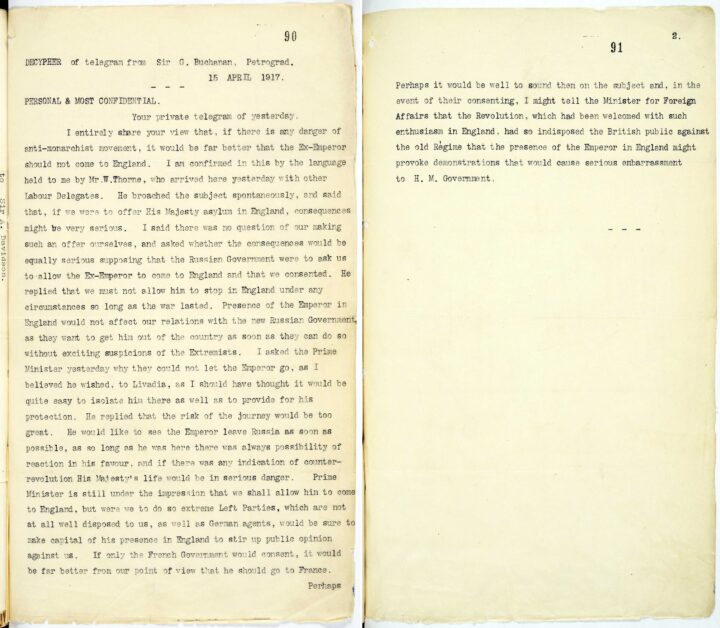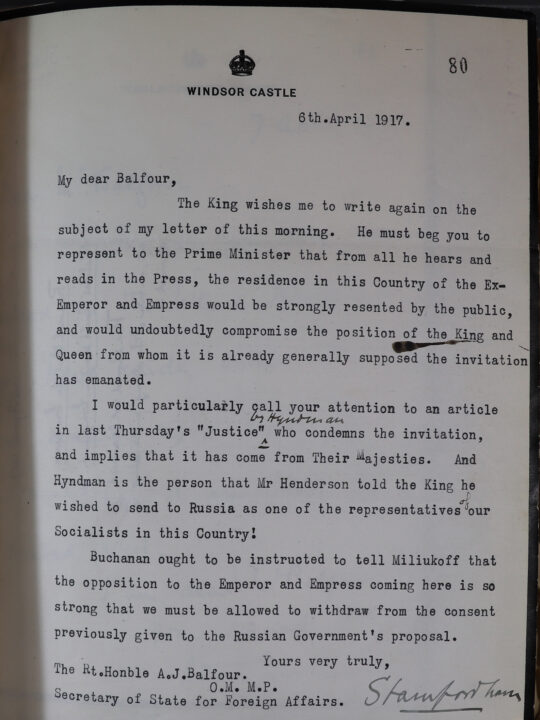
Foreign Office: Records relating to the Russian Revolution
We hope you enjoyed watching our Education Service video with Records Specialist Dr Juliette Desplat looking at records from the Foreign Office. This video focusses on two documents relating to the British government’s reaction to the Russian Revolution.
The Russian Revolution or the Russian Revolution of 1917, involves two revolutions in 1917, the first in February (March according to the new style Gregorian calendar) which ended tsarist rule and the second in October (November) what brought the Bolsheviks to power.
After the first revolution, a Provisional Government was established, and Tsar Nicholas II was forced to abdicate. The Foreign Office wrote to the British Ambassador in Petrograd on 22nd March 1917 to offer ‘asylum to the Emperor and Empress in England which it is hoped they will take advantage of during the war’. Later, owing to fears of growing anti-monarchical sentiment and possible revolution at home, King George V and parliament opposed the idea.
Download Spotlight On: The Russian Revolution Resource Pack
Now try and answer the following questions
- What is the role of the British Foreign Office?
- What types of sources can we find in the Foreign Office Collections?
- What makes Foreign Office documents valuable for historians?
- Can you explain the difference between the two Foreign Office documents focussed on in the video?
- How was Tsar Nicholas II related to the British royal family?
- Why did King George V appear to change his mind about offering political asylum to Tsar Nicholas and his family after March 1917?
Document 1
Telegram from Sir George Buchanan (1854-1924), British Ambassador in Russia, Petrograd, to the Foreign Office in London, Catalogue ref: FO 800/205 f90
- Why did Sir George Buchanan think that granting asylum to the Tsar and his family would have serious consequences in Britain?
- Can you explain the statement ‘German agents, would be sure to make capital of his presence [Tsar Nicholas II] in England’?
- Where else did Buchanan suggest as an alternative location for the Tsar?
- Where did the Tsar wish to go with his family?
- What fears did the Russian Provisional Government have for the Tsar if he remained in Russia?
- What does this telegram infer about the attitude of the British people towards the revolution in Russia at the time?
- What are the advantages and disadvantages of telegrams as historical sources?
- What other sources could you use to find out more British attitudes to the Russian Revolution?
Transcript
DECYPHER of Telegram from Sir G. Buchanan, Petrograd.
15 April 1917.
PERSONAL & MOST CONFIDENTIAL
Your private telegram of yesterday.
I entirely share your view that, if there is any danger of anti-monarchical movement, it would be far better that the Ex-Emperor should not come to England. I am confirmed in this by the language held to me by M. W. Thorne, who arrived here yesterday with other Labour Delegates. He broached the subject spontaneously, and said that, if we were to offer His Majesty asylum in England, consequences might be very serious. I said there was no question of our making such an offer ourselves and asked whether the consequences would be equally serious supposing that the Russian Government were to ask us to allow the Ex-Emperor to come to England and that we consented. He replied that we must not allow him to stop in England under any circumstances so long as the war lasted. Presence of the Emperor in England would not affect our relations with new Russian Government, as they want to get him out of the country as soon as they can do so without exciting suspicions of the Extremists. I asked the Prime Minister yesterday why they could not let the Emperor go as I believed he wished, to Livadia as I should have thought it would be quite easy to isolate him there as well as to provide for his protection. He replied that the risk of the journey would be too great. He would like to see the Emperor leave Russia as soon as possible as so long as he was here, there was always possibility of reaction in his favour, and if there was any indication of counter- revolution His Majesty’s life would be in serious danger. Prime Minister is still under the impression that we shall allow him to come to England, but were we to do so, extreme Left Parties, which are not at all well disposed to us, as well as German agents, would be sure to make capital of his presence in England to stir up public opinion against us. If only the French Government would consent, it would be far better from our point of view.
Perhaps it would be well to sound them on the subject and, in the event of their consenting, I might tell the Minister for Foreign Affairs that the Revolution, which had been welcomed with such enthusiasm in England, had so indisposed the British public against the old Regime that the presence of the Emperor in England might provoke demonstrations that would cause serious embarrassment to H.M. Government.
Glossary
De-cypher: translation from code into words.
Ex-Emperor: Tsar Nicholas II of Russia, cousin of King George V.
Livadia: Tsarist royal palace in the Crimea.
Document 2
Letter to the Secretary of State for Foreign Affairs, A. J. Balfour from King George V’s Private Secretary, Arthur John Bigge, Baron Stamfordham, Catalogue ref: FO 800/25/80
- Why did King George V’s Private Secretary write to the Secretary of State for Foreign Affairs?
- What fears are expressed concerning ‘the Emperor and Empress coming here’?
- What appears to be the tone and attitude of this letter?
- What is the value of this letter as a historical source?
Notes:
Pavel Miliukoff [Miluykov] served as foreign minister, March to May 1917, in the Russian Provisional Government.
Arthur Henderson, Labour politician and member of the British War Cabinet December 1916 to August 1917.
Transcript
6th April 1917
My Dear Balfour,
The King wishes me to write again on the subject of my letter of this morning. He must beg you to represent to the Prime Minister that from all he hears and reads in the Press, the residence in this Country of the Ex-Emperor and Empress would be strongly resented by the public and would undoubtedly compromise the position of the King and Queen from whom it is already generally supposed the invitation has emanated. [comes from]
I would particularly call your attention to an article in last Thursday’s “Justice” by Hyndman who condemns the invitation and implies that it has come from Their Majesties. And Hyndman is the person that Mr Henderson told the King he wished to send to Russia as one of the representatives of our Socialists in this country!
Buchanan [British Ambassador in Russia] ought to be instructed to tell Miliukoff [Miluykov] that the opposition to the Emperor and Empress coming here is so strong that we must be allowed to withdraw from the consent previously given to the Russian Government’s proposal.
Yours very truly
The Right Honourable A.J. Balfour O.M. M.P
Secretary of State for Foreign Affairs,
Stamfordham
Connections to Curriculum
Key stage 4
AQA History GCSE: Understanding the modern world: Russia, 1894–1945: Tsardom and communism
Edexcel History GCSE: Modern Depth Study: Russia and the Soviet Union, 1917–41
Key stage 5
AQA History GCE: Autocracy, Reform and Revolution: Russia, 1855–1917
Edexcel History GCE: Russia in revolution, 1894–1924
OCR History GCE: Russia and its Rulers 1855–1964 or Russia 1894–1941
Key stage 3
Challenges for Britain, Europe, and the wider world 1901 to the present day


